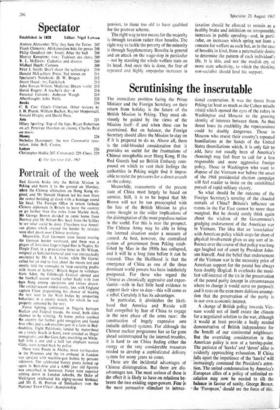Public ends and private means Apart from his wise words
about profits, incest and lechery last weekend, ,Mr, Ray Gunter had something to say about another aspect of welfare. 'Should such benefits as family allowances and housing subsidies be paid to those whose financial position makes them unnecessary?' he demanded. 'Or alter- natively should not the available resources be concentrated on those in the greatest need?'
The cause of selective rather than universal social benefits has become increasingly fashionable in recent years and is now positively trendy. It was hardly likely that our swinging Government would long have remained immune—particularly since the converts that selectivity has won among politicians of all parties it owes less to intel- lectual conviction than to the uncomfortable discovery that any further blanket expansion of the welfare state in the context of a slow- growth economy is likely to mean steadily rising taxation : as good a means as any of electoral suicide. , from the active to the retired, from the child- less to those with children. At present, how- ever, redistribution is achieved chiefly through the agency of a steeply progressive tax system. If benefits, as well as taxes, are to be made progressive—.-which is what the selectivity-mongers are advocating—then the net effect will be that of still further forced egalitarianism in incomes. Is this what the Tories really want to see? In theory, of course, a system of benefits graded according to need might be compensated for by making income tax less progressive. But is this really likely to come from a socialist government?
Moreover, even if income tax were made flatter to offset benefits becoming less flat, serious snags would still remain. Not the least of these is that the British public has a rooted objection to most departures from the flat-rate system. Pensions, for example, are not strictly speaking paid (even gross) on a flat-rate basis: the earnings rule ensures that old people who work to suppplement their incomes have their pensions reduced. It is a classic case of selectivity in practice —and arguably the most hated regulation in the entire welfare state. of complex means-tested or otherwise selec- tive benefits. All that is needed is a pro- gressive income-and-capital tax system to take care of all the redistribution of means that is desirable for the great bulk of the population, coupled with a single and wholly separate type of benefit designed to deal with the relatively small proportion of cases of acute poverty and need.
At present we have neither of these. The personal tax system is defective, because income tax as such does not reach down low enough. To remedy this requires simply the incorporation of national insurance contribu- tions—which reach right down to the very lowest incomes—into the graded income tax system. This would not only remove injustices of the kind that at present mulct a S-a- - week married man with two children of a higher proportion of his income than his counterpart earning £16 a week has to pay (in tax and contributions combined). It would also ensure that flat-rate cash bene- fits become steadily more valuable right the way down the income scale.
The lack of an adequate poverty policy is even easier to remedy. No doubt part of the answer lies in a more generous level of Supplementary Benefit (National Assistance as was). But the real cases of hardship result simply from the 21-year-old 'wage-stop' rule which disallows Supplementary Benefits when these exceed the normal wage of the father when in work, and its corollary which dis- allows Supplementary Benefits to the poorest families because the father is in full-time (but very poorly paid) work. The original justifica- tion for these harsh restrictions was purely theoretical and almost certainly fallacious. They must be drastically amended, as should the equally scandalous denial of any state pension, to those too old to have qualified for the postwar scheme.
The right way to test means for the majority is through taxation rather than benefits. The right way to tackle the poverty of the minority is through Supplementary Benefits in general and an attack on the wage-stop in particular —not by standing the whole welfare state on its head. And once this is done, the fear of repeated and highly unpopular increases in taxation should be allowed to remain as a healthy brake and inhibition on irresponsible increases in public spending—and, in parti- cular, on increases which spring not from a concern for welfare as such but, as in the ease of benefits in kind, from a paternalistic desire to determine the pattern of each individual's life. It is this, and not the modish cry of more state selectivity, to which the thinking non-socialist should lend his support.































